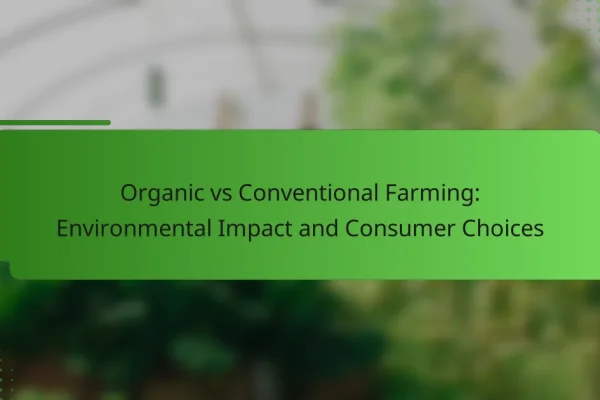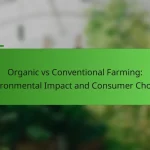How does Slow Food promote sustainable practices in the US?
Slow Food promotes sustainable practices in the US by encouraging local sourcing, biodiversity, and support for small-scale farmers. These principles aim to create a more resilient food system that values quality over quantity and fosters environmental stewardship.
Focus on local sourcing
Local sourcing involves obtaining food from nearby producers, which reduces transportation emissions and supports local economies. By prioritizing ingredients that are grown or produced within a certain radius, consumers can enjoy fresher food while minimizing their carbon footprint.
To effectively implement local sourcing, consider visiting farmers’ markets or joining community-supported agriculture (CSA) programs. These options not only provide access to seasonal produce but also strengthen connections between consumers and local farmers.
Emphasis on biodiversity
Slow Food emphasizes biodiversity by promoting a diverse range of crops and livestock breeds, which enhances ecosystem resilience. This approach helps protect against pests and diseases while ensuring a varied diet for consumers.
To support biodiversity, choose heirloom varieties and traditional breeds when shopping. These options often have unique flavors and nutritional profiles, contributing to a richer culinary experience and preserving agricultural heritage.
Support for small-scale farmers
Supporting small-scale farmers is a cornerstone of the Slow Food movement, as these producers often employ sustainable practices and prioritize quality over mass production. By purchasing from small farms, consumers can help maintain rural livelihoods and promote ethical farming methods.
Engage with small-scale farmers by seeking out local products in grocery stores or participating in farm-to-table events. This not only benefits the farmers but also encourages a more sustainable food system that values community and environmental health.
What are the benefits of adopting Slow Food principles?
Adopting Slow Food principles offers numerous benefits, including improved food quality, enhanced community engagement, and a reduced environmental impact. These practices encourage consumers to prioritize local, seasonal, and sustainably produced foods, fostering a healthier lifestyle and stronger communities.
Improved food quality
Slow Food emphasizes the importance of high-quality ingredients, often sourced from local farmers and producers. This focus on quality results in fresher, more flavorful foods that are often free from harmful additives and preservatives.
By choosing local and seasonal produce, consumers can enjoy fruits and vegetables at their peak ripeness, which enhances taste and nutritional value. Supporting local farmers also encourages sustainable farming practices that prioritize soil health and biodiversity.
Enhanced community engagement
Slow Food practices foster a sense of community by encouraging consumers to connect with local producers and participate in food-related events. This engagement can include farmers’ markets, cooking classes, and community gardens, which help build relationships and strengthen local economies.
Participating in these activities not only supports local businesses but also educates individuals about food origins and sustainable practices. This shared knowledge can lead to a more informed consumer base that values quality over convenience.
Reduced environmental impact
By prioritizing local and seasonal foods, Slow Food principles significantly reduce the carbon footprint associated with food transportation. This shift minimizes the reliance on industrial agriculture, which often contributes to environmental degradation through practices like monocropping and excessive pesticide use.
Additionally, supporting local farms encourages sustainable practices such as crop rotation and organic farming, which are less harmful to the environment. Consumers can further reduce their impact by choosing to eat less meat and processed foods, which typically require more resources to produce.
How can consumers participate in the Slow Food movement?
Consumers can actively engage in the Slow Food movement by making conscious choices that support sustainable food practices and local communities. This involvement can take various forms, from joining local organizations to attending events that promote awareness and education.
Join local chapters
Joining local chapters of the Slow Food movement allows consumers to connect with like-minded individuals who are passionate about sustainable food. These chapters often organize activities, workshops, and discussions that focus on local food systems and environmental issues.
To find a chapter near you, visit the official Slow Food website and search for your region. Participating in meetings and events can enhance your understanding of sustainable practices and provide opportunities to contribute to local initiatives.
Attend Slow Food events
Attending Slow Food events is a great way to immerse yourself in the movement. These events can include food tastings, educational seminars, and community dinners that highlight local ingredients and culinary traditions.
Check local listings or the Slow Food website for upcoming events in your area. Engaging in these activities not only supports local producers but also fosters a sense of community and shared values around food.
Support local farmers’ markets
Supporting local farmers’ markets is a practical way to participate in the Slow Food movement. These markets provide access to fresh, seasonal produce and allow consumers to interact directly with farmers, learning about their growing practices and sustainability efforts.
Make it a habit to visit your local farmers’ market weekly. Look for products that are organic or certified by local agricultural standards to ensure you are making environmentally friendly choices. This support helps sustain local economies and promotes biodiversity in food production.
What are the key criteria for selecting sustainable food products?
Key criteria for selecting sustainable food products include organic certification, fair trade practices, and seasonal availability. These factors help consumers make informed choices that support environmental health and social equity.
Organic certification
Organic certification ensures that food products are grown without synthetic pesticides, fertilizers, or genetically modified organisms (GMOs). Look for labels from recognized certifying bodies, such as the USDA Organic in the United States or the EU Organic logo in Europe.
When choosing organic products, consider that they often have higher prices due to more labor-intensive farming practices. However, the benefits include reduced chemical exposure and support for biodiversity.
Fair trade practices
Fair trade practices focus on providing fair wages and working conditions for farmers and workers in developing countries. Products with fair trade certification guarantee that producers receive a minimum price that covers their costs and allows for sustainable livelihoods.
When selecting fair trade items, look for certifications from organizations like Fair Trade International or the Fair Trade Federation. This ensures that your purchase contributes to social justice and economic stability for marginalized communities.
Seasonal availability
Seasonal availability refers to the consumption of food products that are harvested during their natural growing season. Eating seasonally often means fresher, tastier food and supports local agriculture, reducing the carbon footprint associated with transportation.
To incorporate seasonal foods into your diet, check local farmers’ markets or community-supported agriculture (CSA) programs. This not only promotes sustainability but also helps you discover new flavors and recipes throughout the year.
What are some popular Slow Food initiatives in major cities?
Major cities around the world have embraced Slow Food initiatives to promote local, sustainable food practices. These initiatives often focus on connecting consumers with local producers, enhancing food quality, and fostering community engagement.
Slow Food Nation in San Francisco
Slow Food Nation is a prominent initiative in San Francisco that celebrates local food culture and sustainable practices. This event features a variety of activities, including workshops, tastings, and discussions that emphasize the importance of supporting local farmers and artisans.
Participants can explore the diverse offerings of local cuisine while learning about the benefits of sustainable agriculture. Engaging with local producers helps foster a deeper appreciation for food sources and encourages sustainable consumption habits.
Farmers’ markets in New York City
New York City hosts numerous farmers’ markets that embody the Slow Food philosophy by providing fresh, locally sourced produce directly to consumers. These markets typically feature seasonal fruits, vegetables, and artisanal products, allowing residents to support local farmers while enjoying high-quality food.
Shopping at farmers’ markets not only promotes sustainability but also strengthens community ties. Visitors can often interact with producers, gaining insights into farming practices and the importance of seasonal eating. To maximize benefits, shoppers should consider visiting markets early for the best selection and to support smaller vendors.












